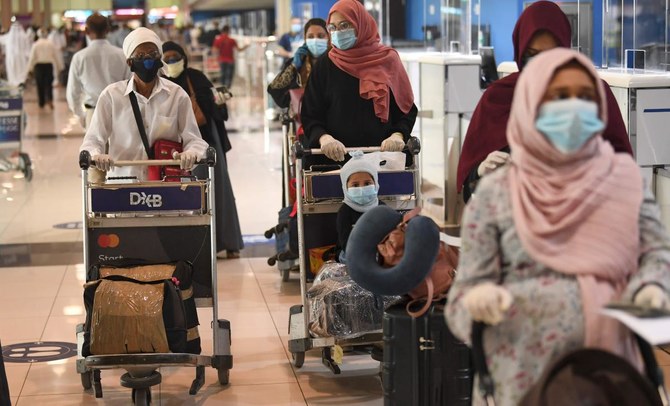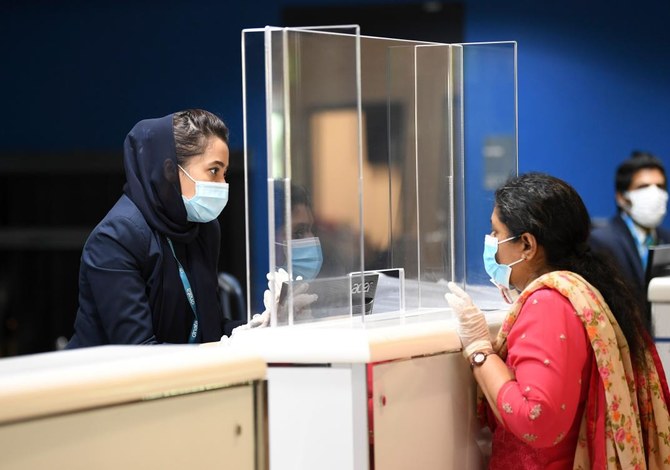DUBAI: The first wave of a massive exercise to repatriate hundreds of thousands of Indians stuck abroad began Thursday, with two flights departing from the United Arab Emirates.
India banned all incoming international flights in late March as it imposed one of the world’s strictest virus lockdowns, leaving vast numbers of workers and students stranded.
Some 15,000 nationals will be repatriated from 12 countries on planes and naval ships, in a mammoth exercise which saw the civil aviation ministry’s website crash Wednesday as panicked citizens rushed to register.
Two warships have steamed to the Maldives and another to the UAE — home to a 3.3-million-strong Indian community which makes up some 30 percent of the Gulf state’s population.
The consulate in Dubai said that it alone had received almost 200,000 applications, appealing on Twitter for “patience and cooperation” as India undertakes the “massive task” of repatriation.
Indian citizens with coveted tickets, arriving at Abu Dhabi and Dubai airports, were greeted by medics in masks, gloves and plastic aprons who took blood samples for antibody tests.
“The results came out in 10 minutes. Mine has been negative. I’m super relieved,” one 40-year-old passenger at Abu Dhabi airport told AFP.
“I’ve lost my job in the company I was working with. I’m feeling a bit weird going home — while I’m happy that I am going home there is also a sense of uncertainty.”
“We have one or two flights planned every day now for the next five or six days,” Consul General Vipul told AFP at Dubai airport.
He said most of those aboard were workers who had lost their jobs, together with pregnant women, the elderly and some stranded tourists.
“Some people will be left out, it’s inevitable in this kind of situation...not everyone can be accommodated immediately,” he said.
The two flights from the UAE — both destined for the southern Indian state of Kerala — will transport just 354 people.
A flight planned for Thursday from Qatar has been postponed until the weekend.
According to Indian media reports, delays have been triggered by the need to test air crew for coronavirus.
A naval vessel is expected to arrive at Dubai’s Port Rashid. The Indian High Commission in the Maldives posted images on Twitter of one of its warships entering Male harbor ahead of Friday’s planned evacuation of some 1,000 people.
Other flights will leave Singapore, Malaysia and the Philippines, as well as London in the United Kingdom and San Francisco, New York, Chicago and Washington in the US.
But frustrations have mounted over the slow pace of the exercise, as well as the fact that evacuees will have to pay for their passage home and spend two weeks in quarantine on arrival.
“There are so many people who have lost their jobs here — they’re literally going hungry,” Yasin, a 50-year-old restaurant manager who is now out of a job, told AFP as he checked in for his flight.
“And now the government has asked for people to pay for the tickets. I sincerely want to request the government to waive that,” he said.
“They should protect their people. People do not have money to survive here, paying for flights is not possible at all.”
Those who haven’t managed to get a ticket home have voiced their frustrations in a torrent of posts on social media, while some turned up to try their luck.
Ajith, a 43-year-old IT engineer whose mother passed away two days ago, waited anxiously at Dubai airport, checking with the official who held the all-important waiting list for the first flight out.
“My mother was old and had medical issues... there is no one in India to take care of things, so I made an emergency request to the consulate,” he told AFP, before finally managing to secure a seat on the plane.


Massive India repatriation begins with flights from UAE
Short Url
https://arab.news/9ugta
Massive India repatriation begins with flights from UAE

- The consulate in Dubai said that it alone had received almost 200,000 applications, appealing on Twitter for “patience and cooperation”
- Indian citizens with coveted tickets, arriving at Abu Dhabi and Dubai airports, were greeted by medics who took blood samples for antibody tests
Netanyahu says US and Israel’s war against Iran will not be an endless one

- “Yes I do,” Netanyahu said, when asked if he saw a lasting path to peace in the Middle East
WASHINGTON: Israeli Prime Minister Benjamin Netanyahu said on Monday that the US and Israel’s war against Iran will not be an endless one and that it will involve quick and decisive action.
“This is not an endless war, this is the gateway to peace” Netanayahu said on Fox News’ “Hannity” program.
“Yes I do,” Netanyahu said, when asked if he saw a lasting path to peace in the Middle East.
© 2026 SAUDI RESEARCH & PUBLISHING COMPANY, All Rights Reserved And subject to Terms of Use Agreement.
















